
Dr. Tavpritesh Sethi, Associate Professor, IIIT-Delhi
tavpriteshsethi@iiitd.ac.in
Learning Signals for Pandemic Preparedness in the Community and ICU Settings
Dr. Tavpritesh Sethi is a physician-scientist and Associate Professor of Computational Biology at Indraprastha Institute of Information Technology Delhi, India and a fellow of the Wellcome Trust/DBT India Alliance at All India Institute of Medical Sciences, New Delhi, India. Over the past two years, he has been a visiting faculty member at Stanford University, School of Medicine from February 2017 to January 2019. He received his M.B.B.S from Government Medical College, Amritsar and PhD from CSIR-Institute of Genomics and Integrative Biology, New Delhi, India. Dr. Sethi specializes in improving outcomes in neonatal, child and maternal health by bridging medicine and artificial intelligence. His research is focused on development and deployment of machine-learning based solutions to enable decisions and policy in pressing healthcare questions such as antimicrobial resistance, sepsis and health inequalities in intensive care and public health settings. He has authored over 20 research articles and has been a recipient of MIT-TR35 India Innovators under 35, Wellcome Trust/DBT India Alliance Early Career Award. He is an editorial board member of PLOS One, Systems Medicine and Journal of Genetics. Dr. Sethi is a member of the European Association of Systems Medicine and leads the Australasia region for International Association of Systems and Networks Medicine (IASyM).
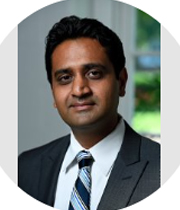
Dr. Vishal Patel, Associate Professor, ECE, Johns Hopkins University
vpatel36@jhu.edu
From U-Net to Transformers: Navigating through key advances in Medical Image Segmentation
Dr. Vishal M. Patel is an Associate Professor in the Department of Electrical and Computer Engineering (ECE) at Johns Hopkins University. Prior to joining Hopkins, he was an A. Walter Tyson Assistant Professor in the Department of ECE at Rutgers University and a member of the research faculty at the University of Maryland Institute for Advanced Computer Studies (UMIACS). He completed his Ph.D. in Electrical Engineering from the University of Maryland, College Park, MD, in 2010. He has received a number of awards including the 2021 IEEE Signal Processing Society (SPS) Pierre-Simon Laplace Early Career Technical Achievement Award, the 2021 NSF CAREER Award, the 2021 IAPR Young Biometrics Investigator Award (YBIA), the 2016 ONR Young Investigator Award, the 2016 Jimmy Lin Award for Invention, A. Walter Tyson Assistant Professorship Award, Best Paper Awards at IEEE AVSS 2017 & 2019, IEEE BTAS 2015, IAPR ICB 2018, IEEE ICIP 2021, and two Best Student Paper Awards at IAPR ICPR 2018. He is an Associate Editor of the IEEE Transactions on Pattern Analysis and Machine Intelligence, Pattern Recognition Journal, and serves on the Machine Learning for Signal Processing (MLSP) Committee of the IEEE Signal Processing Society. He serves as the vice president of conferences for the IEEE Biometrics Council.
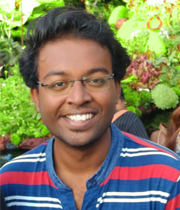
Jeya Maria Jose, Associate Professor, ECE, Johns Hopkins University
jeyamariajose7@gmail.com
From U-Net to Transformers: Navigating through key advances in Medical Image Segmentation
Jeya Maria Jose Valanarasu is currently a Ph.D. student at Johns Hopkins University, in the Department of Electrical and Computer Engineering. Prior to joining Hopkins, he graduated from NIT Trichy, India in 2019 with a Bachelor's degree in Instrumentation and Control Engineering. He also spent some time working in the Biomedical Engineering Department at National University of Singapore (NUS) as a visiting research intern. His research interests include image/3D segmentation, image enhancement, and image-to-image translation for computer vision and medical imaging tasks.
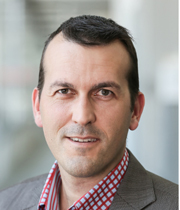
Prof. Dimitri Van De Ville, Professor of Bioengineering, EPFL
dimitri.VanDeVille@epfl.ch
Dynamics of Large-Scale Brain Organization: Transient Activity to Probe fMRI Network Interactions
Prof. Dimitri Van De Ville received his Ph.D. degree in computer science engineering from Ghent University, Belgium, in 2002. He was a post-doctoral fellow (2002-2005) at the lab of Prof. Michael Unser at the Ecole Polytechnique Federale de Lausanne (EPFL), Switzerland, before becoming responsible for the Signal Processing Unit at the University Hospital of Geneva, Switzerland, as part of the Centre d'Imagerie Biomedicale (CIBM). In 2009, he received a Swiss National Science Foundation professorship and since 2015 became Professor of Bioengineering at the EPFL, jointly affiliated with the University of Geneva, Switzerland. His main research interest is in computational neuroimaging to advance cognitive and clinical neurosciences. His methods toolbox includes wavelets, sparsity, deconvolution, graph signal processing. He was a recipient of the Pfizer Research Award 2012, the NARSAD Independent Investigator Award 2014, the Leenaards Foundation Award 2016, and was elected Fellow of the IEEE in 2020 and IEEE Distinguished Lecturer for the Class 2021-2022.
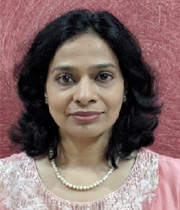
Prof. Ritu Gupta, Laboratory Oncology, Dr BRAIRCH, AIIMS-New Delhi & National Cancer Institute (NCI)-Jhajjar
drritugupta@gmail.com
Optimised AI models for Risk Stratification in Oncology
Prof. Ritu Gupta (drritu.laboncology@aiims.edu) is a faculty at the Institute Rotary Cancer Hospital of All India Institute of Medical Sciences (AIIMS), New Delhi since 2005. She is an alumnus of KMC, Manipal and did specialization in Hemato- Oncopathology at AIIMS, New Delhi. She was a faculty at SGPGI, Lucknow for a short period (2003-2005) during which she set-up flow cytometry and molecular labs in the newly created department of Hematology. She is currently spearheading the cancer laboratories at Dr. B.R.A.IRCH, AIIMS and is actively engaged in establishing diagnostic and research laboratories at National Cancer Institute (NCI), Jhajjar, India. Dr. Gupta has established a Unit of Excellence on Multiple Myeloma at AIIMS, New Delhi. She is recipient of many research grants, and her core areas of research are Multiple myeloma (MM), Acute myeloid leukemia (AML) and Chronic lymphocytic leukemia (http://www.aiims.edu/en/2015-01-02-06-59-02/laboratory-_oncology_faculty.html). Her lab is investigating the tumor microenvironment in hematological malignancies and also investigating molecular genetics and epigenetic factors that are responsible for heterogeneous treatment outcome despite similar clinical presentation. She is currently evaluating the prognostic and therapeutic implications of leukemic stem cells in AML and has established a Center of advanced research (CARE) on AML at AIIMS, New Delhi. As a hematopathologist, she has a keen interest in digital processing of tumor cells and is working on image processing based software solutions for clinical applications. She has published more than 150 papers in peer reviewed journals and is actively engaged in academic activities at National level for training of medical fraternity on advanced laboratory diagnostics including multi-parametric flow cytometry and molecular assays for clinical diagnostics and research. She is also the President of The Cytometry Society (TCS) of India.
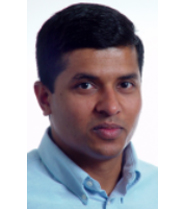
Prof. Gaurav Sharma, Rochester University
gaurav.sharma@rochester.edu
Wearable Sensor Signal Processing and Data Analytics for Health Applications
Prof. Gaurav Sharma is with the University of Rochester, where he is a Professor in the Department of Electrical and Computer Engineering , Department of Computer Science , and Department of Biostatistics and Computational Biology. He is also a Distinguished Researcher in Center of Excellence in Data Science (CoE) at the Goergen Institute for Data Science . From 2008-2010, he served as the Director for the Center for Emerging and Innovative Sciences (CEIS), a New York state supported center for promoting joint university-industry research and technology development, which is housed at the University of Rochester. From 1996 through 2003, he was with Xerox Research and Technology in Webster, NY first as a member of research and technology staff and then as a Principal Scientist and Project Leader. He received the Ph.D. in Electrical and Computer Engineering from North Carolina State University, Raleigh, NC, and masters degrees in Applied Mathematics from NCSU and in Electrical Communication Engineering from the Indian Institute of Science, Bangalore, India. He received his bachelor of engineering degree in Electronics and Communication Engineering from Indian Institute of Technology, Roorkee (formerly, Univ. of Roorkee).
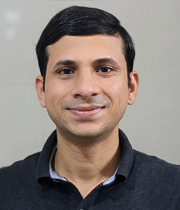
Dr. Hemant Kumar Aggarwal, GE Healthcare
HemantKumar.Aggarwal@ge.com
Model-Based Deep Learning with Applications to MRI
Dr. Aggarwal is working as a staff scientist in the Advanced Technology Group, GE Healthcare, Bangalore, India with broad research interests in inverse problems and physics-inspired deep learning. He received his Ph.D. in computer science in the year 2016 from Indraprastha Institute of Information Technology Delhi. As a postdoctoral research scholar in the Computational Biomedical Imaging Group at the University of Iowa, USA, he developed novel algorithms for accelerated parallel MR image reconstruction that combine the power of recent deep-learning techniques with the traditional model-based algorithms. He has published more than 30 research articles in various top-tier journals and conferences including, IEEE Transactions on Medical Imaging, IEEE Journal of Selected Topics in Signal Processing, and Magnetic Resonance in Medicine. He has served as a reviewer for more than 100 articles for various journals. He received a distinguished reviewer gold level award from IEEE Transactions on Medical Imaging. His collaborative research on parallel imaging got the best machine learning paper award at ISBI 2019. He was nominated for the Emerging Investigator award at the Imaging Elevated-2020 symposium at the University of Utah, USA.
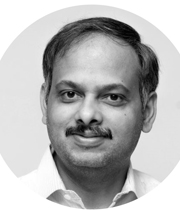
Dr. Raghu Dharmaraju, ARTPARK (AI & Robotics Technology Park) IISc
rdharmaraju@gmail.com
Mr. Raghu Dharamraju did B.Tech. from IIT Madras, M.S. fromUniversity of Massachusetts, Amherst and M.B.A. from Cornell. Over 2 decades, of conceiving and scaling pioneering institutions and innovations: Weighing babies with just phones; Predicting TB patients' treatment adherence; Keeping newborns safe without power; Detecting pests early; etc. Mr. Raghu Dharamraju has built path-breaking portfolio of 8 AI innovations (4 deployed/scaling soon), 1 major national initiative, and 40 partnerships as the founding VP - Products & Programs at Wadhwani AI. Google AI Impact Challenge winner. AI XPRIZE semifinalist. Raised $19M from Gates Foundation, USAID, Google.org. Established Wadhwani AI as a unique, globally reputed organization developing AI for social good. He has Launched and scaled award-winning med-tech innovations (Embrace infant warmers), reaching ~1,000,000 babies via WHO and non-profits, governments, and 300+ private hospitals in 100+ small towns. He is the selector/advisor for innovation grants and investment programs: Grand Challenges, Stanford Biodesign, Dept. of Biotech’s BIG (Biotech Ignition Grants), IKP, VentureWell, Berkeley. Dr. Dharamraju led strategy, product management, and startup operations for new global business (~$150 million in 2009) at Corning Environmental Technologies. His dominant themes are digital health, med-tech, agriculture, mid/low-income users, social impact. Dr. Dharamraju also holds experience in environmental technologies, solar energy, financial inclusion, circular economy."
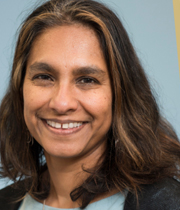
Prof. Jayashree Kalpathy, Chief, Division of Artificial Medical Intelligence in Ophthalmology, University of Colorado (CU) School of Medicine, Colorado, USA
JKALPATHY-CRAMER@mgh.harvard.edu
A practical guide to the opportunities and challenges of artificial intelligence in medical imaging
Prof. Jayashree Kalpathy-Cramer, PhD, has been named chief of the new Division of Artificial Medical Intelligence in Ophthalmology at the University of Colorado (CU) School of Medicine. In her new role, Kalpathy-Cramer will translate novel artificial intelligence (AI) methods into effective patient care practices at the Sue Anschutz-Rodgers Eye Center. Kalpathy-Cramer is currently director of the QTIM lab and the Center for Machine Learning at the Athinoula A. Martinos Center for Biomedical Imaging and an associate professor of radiology at Harvard Medical School.
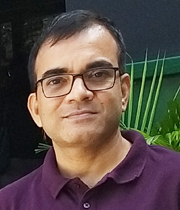
Dr. Bipul Das (GE Healthcare)
bipul.das@ge.com
Impact of AI in Healthcare: Transcending system limitations in Imaging
Bipul Das is a Principal Data Scientist at Wipro GE HealthCare with expertise in AI for Imaging Technologies. He has two decades of successful research experience in Medical Imaging leading to number of products for GE, multiple publications and patents in this field. After completing his PhD from Department of E&ECE, IIT Kharagpur, he pursued post-doctoral studies in University of Pennsylvania where he continued research on medical image analysis. In 2005, Bipul joined GE Global Research in Bangalore, India as Research Scientist and till date have worked on multiple programs in image analysis, signal processing and AI across different modalities. Bipul has published more than 30 peer reviewed papers in international journals and conferences and co-authored more than 20 patents.

Dr. Rohit Verma, Department of Psychiatry and National Drug Dependence Treatment Centre, All India Institute of Medical Sciences, New Delhi, India
rohit.aiims@gmail.com
Artificial Neural Networks in Psychosis Prediction
Dr. Rohit Verma, an alumni of GMC, Kota, Rajasthan (MBBS) and AIIMS, New Delhi (MD Psychiatry), Dr. Rohit Verma further pursued his professional training at GB Pant Hospital, New Delhi and PGIMER RML Hospital, New Delhi as Senior Resident and Lady Hardinge Medical College, New Delhi as Assistant Professor before rejoining AIIMS, New Delhi in the capacity of Assistant Professor from 2014. Apart from patient care, teaching and administrative responsibilities, he has been involved in research on various platforms. He has been commended for his work on disability in severe mental illness (Dr. BB Sethi Award) and disaster related mental health (Dr. GC Boral Award) by national societies. With interest towards the interface of Neurology and Psychiatry, he conducted research and was acclaimed for it by national and international research societies (Junior Scientist Award & Travel Grants). He is working in the field of Brain Mapping & Stimulation with state-of-the-art set up at AIIMS.
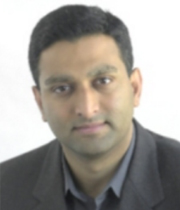
Dr. Ramesh Raskar, MIT Media Labs
askar@media.mit.edu
Making Invisible Visible with Data, ML and Devices Explainable
Dr. Ramesh Raskar is an Associate Professor at MIT Media Lab and directs the Camera Culture research group. His focus is on AI and Imaging for health and sustainability. These interfaces span research in physical (e.g., sensors, health-tech), digital (e.g., automating machine learning) and global (e.g., geomaps, autonomous mobility) domains. He received the Lemelson Award (2016), ACM SIGGRAPH Achievement Award (2017), DARPA Young Faculty Award (2009), Alfred P. Sloan Research Fellowship (2009), TR100 Award from MIT Technology Review (2004) and Global Indus Technovator Award (2003). He has worked on special research projects at Google [X], Apple and Facebook and co-founded/advised several companies.
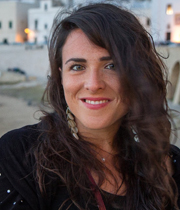
Dr. Preti Maria Giulia, EPFL
maria.preti@epfl.ch
Brain structure-function coupling provides signatures for task decoding and individual fingerprinting
Dr. Maria Giulia Preti is a lecturer at University of Geneva, Switzerland, and a research staff scientist at the CIBM Center for Biomedical Imaging, Switzerland. She received her Ph.D. in Bioengineering at Politecnico di Milano (Milan, Italy) in 2013. In 2011, she was awarded a Progetto Rocca fellowship from MIT-Italy and spent a visiting research period at the MIT and Harvard Medical School (Boston, USA). Dr. Preti has joined Prof. Van De Ville group at the EPFL and University of Geneva as a post-doctoral researcher in 2013. Her current research aims at understanding the connections between brain functionality and brain microscopic anatomy by using advanced techniques of MRI, signal processing and graph analysis. In particular, she is working on functional MRI, functional connectivity, diffusion tensor imaging and tractography, integration of MRI with other techniques (e.g. EEG), and the application of these methods to several neurological diseases, including neurodegenerative conditions. She is the author of more than 40 journal publications on basic neuroscience and computational brain imaging, including in high-profile journals such as Trends in Neurosciences and Nature Communications.
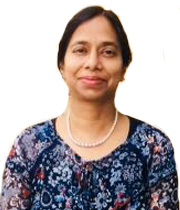
Prof. Anubha Gupta, Professor, ECE, IIIT-Delhi
anubha@iiitd.ac.in
Explainable AI models for ECG data Analysis
Prof. Anubha Gupta graduated with a Ph.D. degree in Electrical Engineering from IIT Delhi in 2006. She did her bachelor's and master's in ECE from Delhi University in 1991 and 1997, respectively. She started her professional career with the position of Assistant Director at ALL India Radio (through Indian Engineering Services) in 1993 and worked there until Feb. 1999. In Feb. 1999, she joined Netaji Subhas Institute of Technology (NSIT), Dwarka, Delhi. She worked as Assistant Professor in the Computer Engineering Department at NSIT for eight years. From July 2011 to Dec. 2013, she worked as associate professor at IIIT Hyderabad. In Dec 2013, she joined IIIT Delhi, where she is currently working as a Professor in the Department of Electronics and Communication Engineering. Apart from her engineering interests, Dr. Gupta is deeply interested in education policy issues. She did her second master's as a full time student from University of Maryland College Park, USA from 2008 to 2010. During this time, she worked as a project manager on a state policy related education project at the University System of Maryland, USA. On graduation, she worked as Director of Assessment at the Bowie State University, Maryland USA from Oct. 2010 to April 2011.

Dr. Manu Kumar Shetty, Maulana Azad Medical College(MAMC)
shetty080@gmail.com
AI for pharmacovigilance
I have >10 yrs experience of working in hospitals, medical colleges and pharmaceutical companies. To my healthcare experience, I have nicely melded with new tech skills like AI/ML, from python to Deep learning to interpretable AI. I developed AI models, published in reputed journals. Important projects include: ML model to monitor Post-COVID cardiac status using ECG, Detection of stress using ECG, ML model to predict mortality in STEMI patients, in-silico drug screening model.
